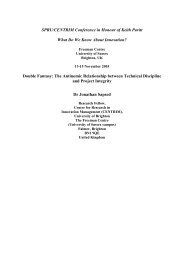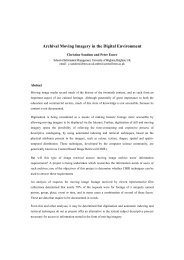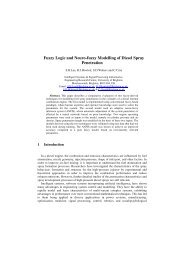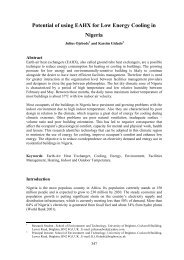NESTA Crime Online - University of Brighton Repository
NESTA Crime Online - University of Brighton Repository
NESTA Crime Online - University of Brighton Repository
Create successful ePaper yourself
Turn your PDF publications into a flip-book with our unique Google optimized e-Paper software.
video games. 83 However, the activities and level <strong>of</strong> organisation <strong>of</strong> Chinese hackers<br />
transcends the online game industry. A 2009 report provided compelling evidence and<br />
detail <strong>of</strong> the efforts <strong>of</strong> a network <strong>of</strong> Chinese hackers – which researchers have called<br />
GhostNet – that uses a malicious s<strong>of</strong>tware programme to steal sensitive documents,<br />
control web cams and completely control infected computers. Investigations have<br />
disclosed 1,295 hacked computers in 103 countries belonging to international<br />
institutions. The report says "GhostNet represents a network <strong>of</strong> compromised computers<br />
resident in high-value political, economic and media locations spread across numerous<br />
countries worldwide." 84 There are also concerns that Chinese groups are becoming adept<br />
at applying ransomware. 85 Of particular concern is where ‘Denial <strong>of</strong> Service’ (DoS)<br />
attacks are beginning to target government agencies beyond China and thereby<br />
developing the potential to use these means as a weapon <strong>of</strong> war. There are very strong<br />
suspicions that these efforts at the very least are sanctioned or involve the state. 86<br />
(C) Russia has traditionally been considered the original home <strong>of</strong> cybercrime, where<br />
high technical skills combine with a stumbling economy and a long tradition <strong>of</strong> organised<br />
crime. 87 Russian programmers are believed to be behind the most widely used malware-<br />
making toolkits such as Mpack and WebAttacker. Dubbed ‘the mother <strong>of</strong> cybercrime’, the<br />
Russian Business Network (RBN) has been linked by security firms to child pornography,<br />
83 Kaspersky, “Security Trends 2008”. This subject has also been reported by vnunet.com, “Identity theft feeds<br />
$1 bn gaming black market”, February 21 2006.<br />
84 Information Warfar Monitor (2009) “Tracking GhostNet: Investigating a Cyber Espionage Network”.<br />
85 Malicious s<strong>of</strong>tware which hijacks a personal computer and locks files until a ransom is paid. The first known<br />
case in the UK was in mid-1996 when a nurse from Rochdale found her computer files locked and was notified<br />
that she would have to pay to access a password to have them unlocked (presumably by credit card).<br />
Chapman, M., (1 st June 2006), Ransomware hijacks nurse’s PC, vnunet.com,<br />
http://msn.vnunet.com/vnunet/news/2157359/ransomeware-hijacks-nurse-pc, accessed 3 rd December 2008.<br />
86 Greenemeier, L., (18 th September 2007), China’s Cyber Attacks Signal New Battlefield in <strong>Online</strong>, Scientific<br />
American, http://www.sciam.com/article.cfm?id=chinas-Cyber-attacks-sign, accessed 4 th December 2008.<br />
87 In 1993, after the European Council invited Estonia, Latvia and Lithuania to apply for EU accession, the<br />
Baltic States implemented an intensive period <strong>of</strong> national and cultural reconstruction following years <strong>of</strong><br />
encroachment from Russia, especially the penetration <strong>of</strong> Russian organised crime groups. At the centre <strong>of</strong><br />
this purge was an attempt to stem the incursion <strong>of</strong> non-indigenous criminal influence on public-sector<br />
employers. It would seem that very early on in the evolution <strong>of</strong> the Internet, Russian organised crime<br />
became aware <strong>of</strong> its potential. After the collapse <strong>of</strong> the Soviet Union, the nascent Russian Business Network<br />
(RBN) is thought to have taken a keen interest in the IT skills that existed in the Baltic States. It also took a<br />
similar interest in the underemployed IT experts in the former Soviet Union’s military, many <strong>of</strong> whom<br />
remained unpaid for months on end.<br />
Page 30
















